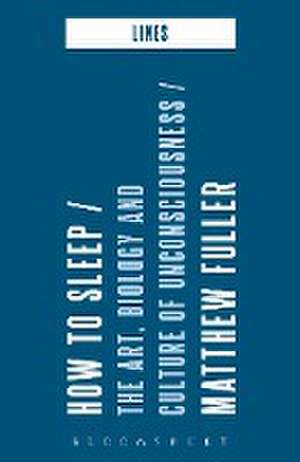How to Sleep: The Art, Biology and Culture of Unconsciousness: Lines
Autor Matthew Fulleren Limba Engleză Paperback – 24 ian 2018
| Toate formatele și edițiile | Preț | Express |
|---|---|---|
| Paperback (1) | 157.32 lei 43-57 zile | |
| Bloomsbury Publishing – 24 ian 2018 | 157.32 lei 43-57 zile | |
| Hardback (1) | 537.30 lei 43-57 zile | |
| Bloomsbury Publishing – 24 ian 2018 | 537.30 lei 43-57 zile |
Preț: 157.32 lei
Preț vechi: 172.07 lei
-9% Nou
Puncte Express: 236
Preț estimativ în valută:
30.11€ • 32.72$ • 25.31£
30.11€ • 32.72$ • 25.31£
Carte tipărită la comandă
Livrare economică 21 aprilie-05 mai
Preluare comenzi: 021 569.72.76
Specificații
ISBN-13: 9781474288705
ISBN-10: 1474288707
Pagini: 192
Dimensiuni: 138 x 216 x 18 mm
Greutate: 0.23 kg
Editura: Bloomsbury Publishing
Colecția Bloomsbury Academic
Seria Lines
Locul publicării:London, United Kingdom
ISBN-10: 1474288707
Pagini: 192
Dimensiuni: 138 x 216 x 18 mm
Greutate: 0.23 kg
Editura: Bloomsbury Publishing
Colecția Bloomsbury Academic
Seria Lines
Locul publicării:London, United Kingdom
Caracteristici
The interdisciplinary nature of this texts means that it should be of interest and relevance right across the humanities including philosophy, media studies, art and aesthetics, cultural and critical theory to name but a few
Notă biografică
Matthew Fuller is Professor of Cultural Studies, Goldsmiths, University of London, UK. He is co-author of Evil Media (2012), Editor of Software Studies: a Lexicon (2008) and co-editor of the journal Computational Culture.
Cuprins
prefaceacknowledgements1. How to Sleep2. Without Thinking3. Dormant4. I Don't Want to be Awake5. The Domestic Architecture of the Skull6. Heroes of Sleep7. Too Much Dream8. Mediating8. Sleep Acts9. Repulsive Sleep10. Ingredients of Sleep11. Sleep Gltiches12. Body Parts13. Be Unconscious14. The Luxuriance of Dissolving15. Free-Running16. Sleep in Love17. Vulnerable18. Hyperpassivity19. The Eye Busy Unseeing20. How to Thrive Biologically21. Repetition22. Architecture23. Laws Governing Sleep24. Film Sleep25. Man Controls the Day.But We Will Control the Night26. Headless Brim27. Trains and Buses28. The Smell of Sleep29. The Child's Bed30. Brain as Labourer31. Melnikov's Promethean Sleepers32. Sleep on the Road33. Terraforming34. Dozy-looking35. Nocturne36. Waking Up37. Equipment38. Sleep Upright In Order to Avoid Death39. Animal Sleep40. Wrap Up Warmbibliographyindex
Recenzii
Matthew Fuller has composed a revelatory and brilliantly original book. This richly insightful and multifaceted work will be indispensable reading for anyone concerned with the increasingly urgent problem of sleep.
Where do you fall when you fall asleep? Out of consciousness and into a state of quasi-death, or into an unconscious form of activity? Do you withdraw from the world or get projected upon it differently? Who is the subject of sleep? Like love, sleep makes us creative and vulnerable at the same time. It is a democratic state, yet inaccessible to phenomenological accounts: it does not even make sense to state: "I am asleep", and yet sleep deprivation is torture. Arguing passionately that sleep is both our posthuman, animal core and a form of power, this original volume performs a series of sleep acts, ranging from insomnia, apnea, narcolepsy, to sleep-walking, doziness, cataplexy and plain not wanting to wake up. In a brilliant combination of aphorisms, meditations, snippets of self-help and shreds of critical analysis, the book explores the bio-politics of sleep, as well as its social, psychological and aesthetic aspects. This is Matthew Fuller at his best: witty, theoretically sharp and thoroughly enjoying his inimitable flair for paradoxes.
Where do you fall when you fall asleep? Out of consciousness and into a state of quasi-death, or into an unconscious form of activity? Do you withdraw from the world or get projected upon it differently? Who is the subject of sleep? Like love, sleep makes us creative and vulnerable at the same time. It is a democratic state, yet inaccessible to phenomenological accounts: it does not even make sense to state: "I am asleep", and yet sleep deprivation is torture. Arguing passionately that sleep is both our posthuman, animal core and a form of power, this original volume performs a series of sleep acts, ranging from insomnia, apnea, narcolepsy, to sleep-walking, doziness, cataplexy and plain not wanting to wake up. In a brilliant combination of aphorisms, meditations, snippets of self-help and shreds of critical analysis, the book explores the bio-politics of sleep, as well as its social, psychological and aesthetic aspects. This is Matthew Fuller at his best: witty, theoretically sharp and thoroughly enjoying his inimitable flair for paradoxes.




